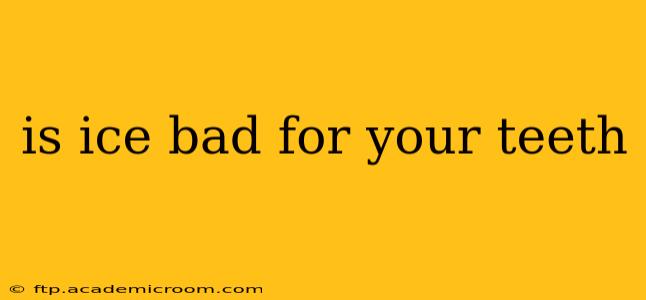Chewing ice may seem harmless, a refreshing way to cool down on a hot day. However, the seemingly innocent act of crunching on ice cubes can actually be detrimental to your dental health. This article delves into the potential dangers of chewing ice, addressing common concerns and offering solutions to protect your pearly whites.
Can Chewing Ice Damage Your Teeth?
Yes, chewing ice can significantly damage your teeth. The hardness of ice can cause several problems:
-
Cracked or Chipped Teeth: Ice is significantly harder than your tooth enamel, the protective outer layer. The force of chewing ice can easily cause cracks or chips, especially in teeth that are already weakened or have existing fillings. These cracks can lead to further damage and sensitivity.
-
Broken Fillings and Crowns: If you have existing dental work, like fillings or crowns, chewing ice can dislodge or break them. This necessitates costly repairs and potential further damage to the underlying tooth structure.
-
Worn Enamel: The constant abrasion from chewing ice gradually wears away the enamel, making your teeth more vulnerable to cavities, sensitivity, and discoloration. This wear and tear can be irreversible.
-
Increased Tooth Sensitivity: As enamel erodes, the underlying dentin becomes exposed. Dentin is much more sensitive to temperature changes and pressure, leading to discomfort when consuming hot or cold foods and drinks.
What Happens if You Crack a Tooth Chewing Ice?
Cracking a tooth while chewing ice is a serious matter requiring immediate attention. Depending on the severity of the crack, you may experience pain, sensitivity, or even notice a visible fracture. You should see a dentist immediately. Ignoring a cracked tooth can lead to infection, further damage, and even tooth loss.
Is it Okay to Occasionally Chew Ice?
While the occasional slip-up probably won't cause immediate catastrophe, it's best to avoid chewing ice altogether. The cumulative effect of even infrequent ice chewing can lead to significant long-term damage. Think of it like this: would you repeatedly scrape a knife across a fine china plate? The same principle applies to your teeth.
How Can I Stop Chewing Ice?
Breaking the habit of chewing ice can be challenging, but it's crucial for your dental health. Here are a few tips:
- Identify Triggers: What situations make you crave chewing ice? Boredom? Thirst? Addressing the underlying cause can help break the habit.
- Find Alternatives: Keep a bottle of water handy or enjoy some sugar-free gum to satisfy the urge to chew.
- Be Mindful: Pay attention to your behavior and consciously choose to avoid ice cubes.
- Stay Hydrated: Dehydration can sometimes lead to a desire to chew ice. Drinking plenty of water throughout the day helps prevent this.
What are the Long-Term Effects of Chewing Ice?
The long-term effects of chewing ice can be significant and costly. They include irreversible tooth damage, increased sensitivity, costly dental repairs, and even tooth loss. Protecting your enamel now is a better investment than dealing with extensive dental work later.
Conclusion: Protect Your Smile
While seemingly harmless, chewing ice poses a significant threat to your dental health. The cumulative effect of this seemingly innocent habit can cause severe and irreversible damage. By understanding the risks and implementing strategies to avoid chewing ice, you can protect your smile and maintain optimal oral health. Remember, prevention is always better than cure when it comes to protecting your teeth.
